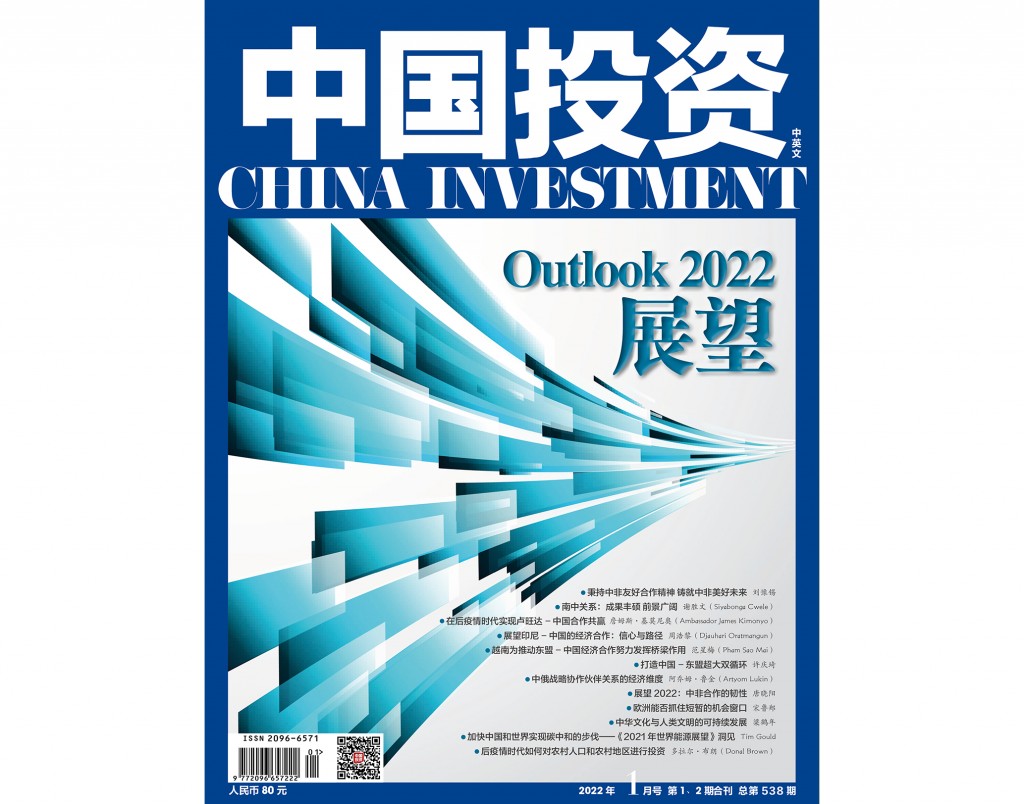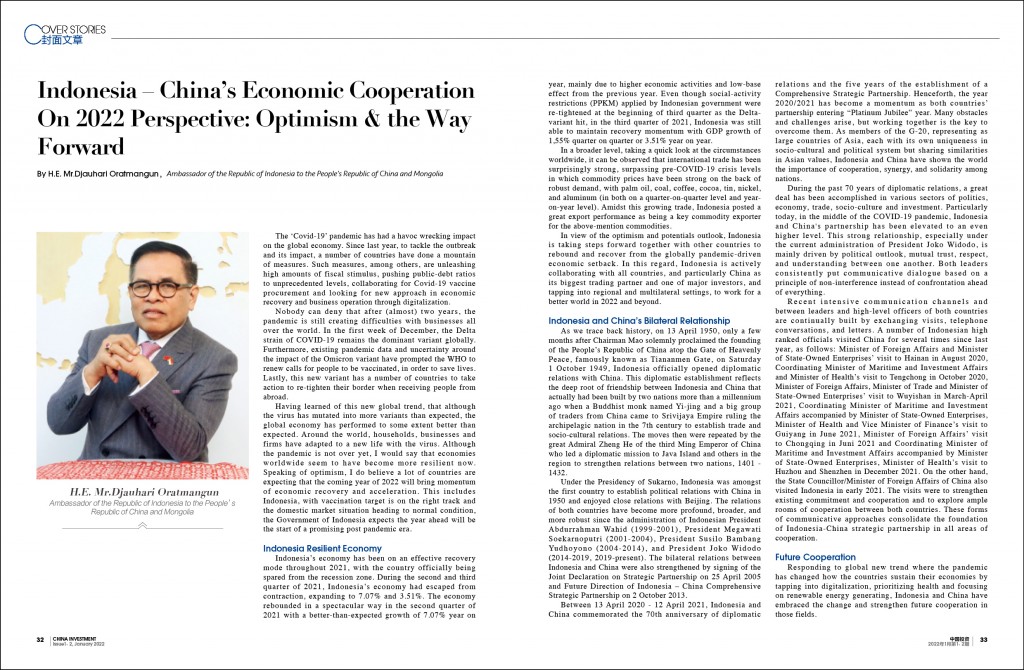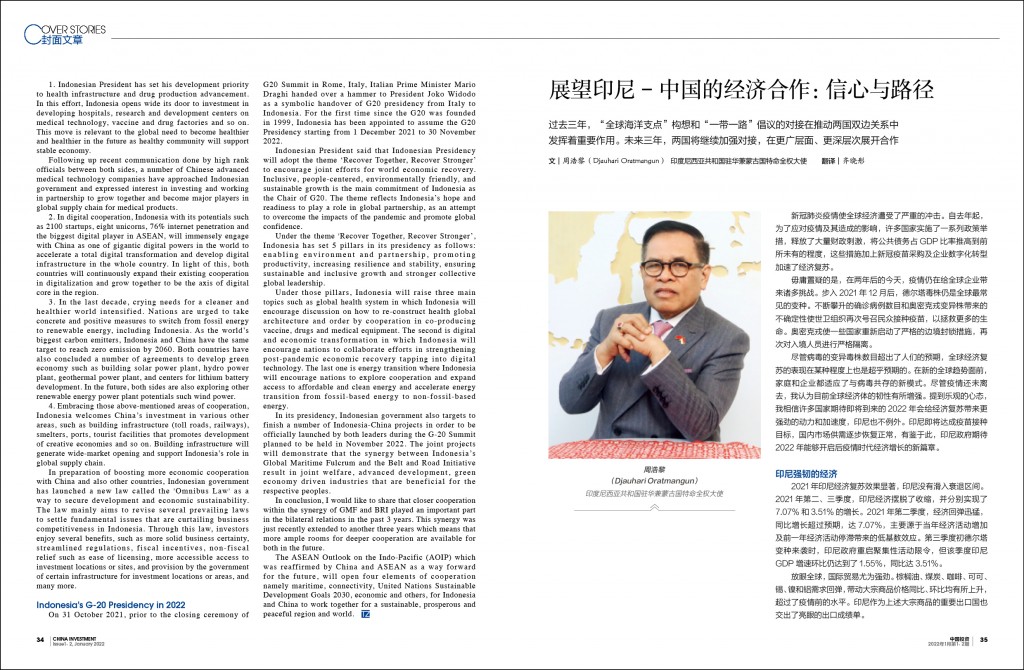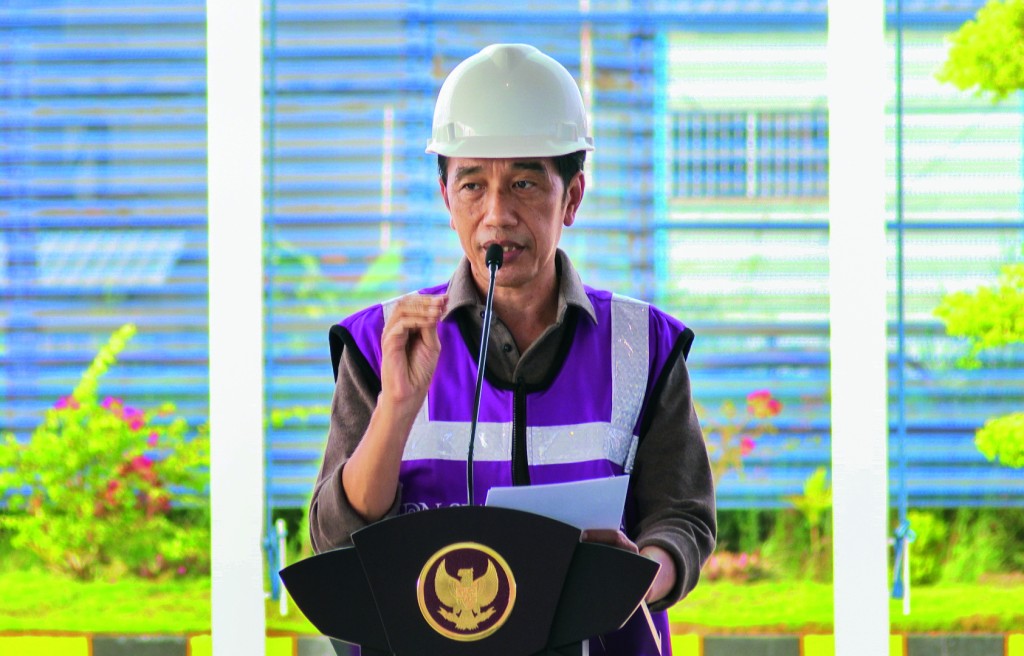
2022展望
By H.E. Mr.Djauhari Oratmangun,Ambassador of the Republic of Indonesia to the People’s Republic of China and Mongolia
文|周浩黎(Djauhari Oratmangun) 印度尼西亚共和国驻华兼蒙古国特命全权大使
导读
●印尼强韧的经济
●印尼和中国的双边关系
●未来合作
●2022年二十国集团轮值主席国印度尼西亚
Indonesia – China’s Economic Cooperation On 2022 Perspective: Optimism & the Way Forward
The ‘Covid-19’ pandemic has had a havoc wrecking impact on the global economy. Since last year, to tackle the outbreak and its impact, a number of countries have done a mountain of measures. Such measures, among others, are unleashing high amounts of fiscal stimulus, pushing public-debt ratios to unprecedented levels, collaborating for Covid-19 vaccine procurement and looking for new approach in economic recovery and business operation through digitalization.
Nobody can deny that after (almost) two years, the pandemic is still creating difficulties with businesses all over the world. In the first week of December, the Delta strain of COVID-19 remains the dominant variant globally. Furthermore, existing pandemic data and uncertainty around the impact of the Omicron variant have prompted the WHO to renew calls for people to be vaccinated, in order to save lives. Lastly, this new variant has a number of countries to take action to re-tighten their border when receiving people from abroad.
Having learned of this new global trend, that although the virus has mutated into more variants than expected, the global economy has performed to some extent better than expected. Around the world, households, businesses and firms have adapted to a new life with the virus. Although the pandemic is not over yet, I would say that economies worldwide seem to have become more resilient now. Speaking of optimism, I do believe a lot of countries are expecting that the coming year of 2022 will bring momentum of economic recovery and acceleration. This includes Indonesia, with vaccination target is on the right track and the domestic market situation heading to normal condition, the Government of Indonesia expects the year ahead will be the start of a promising post pandemic era.
Indonesia Resilient Economy
Indonesia’s economy has been on an effective recovery mode throughout 2021, with the country officially being spared from the recession zone. During the second and third quarter of 2021, Indonesia’s economy had escaped from contraction, expanding to 7.07% and 3.51%. The economy rebounded in a spectacular way in the second quarter of 2021 with a better-than-expected growth of 7.07% year on year, mainly due to higher economic activities and low-base effect from the previous year. Even though social-activity restrictions (PPKM) applied by Indonesian government were re-tightened at the beginning of third quarter as the Delta-variant hit, in the third quarter of 2021, Indonesia was still able to maintain recovery momentum with GDP growth of 1,55% quarter on quarter or 3.51% year on year.
In a broader level, taking a quick look at the circumstances worldwide, it can be observed that international trade has been surprisingly strong, surpassing pre-COVID-19 crisis levels in which commodity prices have been strong on the back of robust demand, with palm oil, coal, coffee, cocoa, tin, nickel, and aluminum (in both on a quarter-on-quarter level and year-on-year level). Amidst this growing trade, Indonesia posted a great export performance as being a key commodity exporter for the above-mention commodities.
In view of the optimism and potentials outlook, Indonesia is taking steps forward together with other countries to rebound and recover from the globally pandemic-driven economic setback. In this regard, Indonesia is actively collaborating with all countries, and particularly China as its biggest trading partner and one of major investors, and tapping into regional and multilateral settings, to work for a better world in 2022 and beyond.
As we trace back history, on 13 April 1950, only a few months after Chairman Mao solemnly proclaimed the founding of the People’s Republic of China atop the Gate of Heavenly Peace, famously known as Tiananmen Gate, on Saturday 1 October 1949, Indonesia officially opened diplomatic relations with China. This diplomatic establishment reflects the deep root of friendship between Indonesia and China that actually had been built by two nations more than a millennium ago when a Buddhist monk named Yi-jing and a big group of traders from China came to Srivijaya Empire ruling the archipelagic nation in the 7th century to establish trade and socio-cultural relations. The moves then were repeated by the great Admiral Zheng He of the third Ming Emperor of China who led a diplomatic mission to Java Island and others in the region to strengthen relations between two nations, 1401 – 1432.
Under the Presidency of Sukarno, Indonesia was amongst the first country to establish political relations with China in 1950 and enjoyed close relations with Beijing. The relations of both countries have become more profound, broader, and more robust since the administration of Indonesian President Abdurrahman Wahid (1999-2001), President Megawati Soekarnoputri (2001-2004), President Susilo Bambang Yudhoyono (2004-2014), and President Joko Widodo (2014-2019, 2019-present). The bilateral relations between Indonesia and China were also strengthened by signing of the Joint Declaration on Strategic Partnership on 25 April 2005 and Future Direction of Indonesia – China Comprehensive Strategic Partnership on 2 October 2013.
Between 13 April 2020 – 12 April 2021, Indonesia and China commemorated the 70th anniversary of diplomatic relations and the five years of the establishment of a Comprehensive Strategic Partnership. Henceforth, the year 2020/2021 has become a momentum as both countries’ partnership entering “Platinum Jubilee” year. Many obstacles and challenges arise, but working together is the key to overcome them. As members of the G-20, representing as large countries of Asia, each with its own uniqueness in socio-cultural and political system but sharing similarities in Asian values, Indonesia and China have shown the world the importance of cooperation, synergy, and solidarity among nations.
During the past 70 years of diplomatic relations, a great deal has been accomplished in various sectors of politics, economy, trade, socio-culture and investment. Particularly today, in the middle of the COVID-19 pandemic, Indonesia and China’s partnership has been elevated to an even higher level. This strong relationship, especially under the current administration of President Joko Widodo, is mainly driven by political outlook, mutual trust, respect, and understanding between one another. Both leaders consistently put communicative dialogue based on a principle of non-interference instead of confrontation ahead of everything.
Recent intensive communication channels and between leaders and high-level officers of both countries are continually built by exchanging visits, telephone conversations, and letters. A number of Indonesian high ranked officials visited China for several times since last year, as follows: Minister of Foreign Affairs and Minister of State-Owned Enterprises’ visit to Hainan in August 2020, Coordinating Minister of Maritime and Investment Affairs and Minister of Health’s visit to Tengchong in October 2020, Minister of Foreign Affairs, Minister of Trade and Minister of State-Owned Enterprises’ visit to Wuyishan in March-April 2021, Coordinating Minister of Maritime and Investment Affairs accompanied by Minister of State-Owned Enterprises, Minister of Health and Vice Minister of Finance’s visit to Guiyang in June 2021, Minister of Foreign Affairs’ visit to Chongqing in Juni 2021 and Coordinating Minister of Maritime and Investment Affairs accompanied by Minister of State-Owned Enterprises, Minister of Health’s visit to Huzhou and Shenzhen in December 2021. On the other hand, the State Councillor/Minister of Foreign Affairs of China also visited Indonesia in early 2021. The visits were to strengthen existing commitment and cooperation and to explore ample rooms of cooperation between both countries. These forms of communicative approaches consolidate the foundation of Indonesia-China strategic partnership in all areas of cooperation.
Responding to global new trend where the pandemic has changed how the countries sustain their economies by tapping into digitalization, prioritizing health and focusing on renewable energy generating, Indonesia and China have embraced the change and strengthen future cooperation in those fields.1. Indonesian President has set his development priority to health infrastructure and drug production advancement. In this effort, Indonesia opens wide its door to investment in developing hospitals, research and development centers on medical technology, vaccine and drug factories and so on. This move is relevant to the global need to become healthier and healthier in the future as healthy community will support stable economy.
Following up recent communication done by high rank officials between both sides, a number of Chinese advanced medical technology companies have approached Indonesian government and expressed interest in investing and working in partnership to grow together and become major players in global supply chain for medical products.
2. In digital cooperation, Indonesia with its potentials such as 2100 startups, eight unicorns, 76% internet penetration and the biggest digital player in ASEAN, will immensely engage with China as one of gigantic digital powers in the world to accelerate a total digital transformation and develop digital infrastructure in the whole country. In light of this, both countries will continuously expand their existing cooperation in digitalization and grow together to be the axis of digital core in the region.
3. In the last decade, crying needs for a cleaner and healthier world intensified. Nations are urged to take concrete and positive measures to switch from fossil energy to renewable energy, including Indonesia. As the world’s biggest carbon emitters, Indonesia and China have the same target to reach zero emission by 2060. Both countries have also concluded a number of agreements to develop green economy such as building solar power plant, hydro power plant, geothermal power plant, and centers for lithium battery development. In the future, both sides are also exploring other renewable energy power plant potentials such wind power.
4. Embracing those above-mentioned areas of cooperation, Indonesia welcomes China’s investment in various other areas, such as building infrastructure (toll roads, railways), smelters, ports, tourist facilities that promotes development of creative economies and so on. Building infrastructure will generate wide-market opening and support Indonesia’s role in global supply chain.
In preparation of boosting more economic cooperation with China and also other countries, Indonesian government has launched a new law called the ‘Omnibus Law’ as a way to secure development and economic sustainability. The law mainly aims to revise several prevailing laws to settle fundamental issues that are curtailing business competitiveness in Indonesia. Through this law, investors enjoy several benefits, such as more solid business certainty, streamlined regulations, fiscal incentives, non-fiscal relief such as ease of licensing, more accessible access to investment locations or sites, and provision by the government of certain infrastructure for investment locations or areas, and many more.
On 31 October 2021, prior to the closing ceremony of G20 Summit in Rome, Italy, Italian Prime Minister Mario Draghi handed over a hammer to President Joko Widodo as a symbolic handover of G20 presidency from Italy to Indonesia. For the first time since the G20 was founded in 1999, Indonesia has been appointed to assume the G20 Presidency starting from 1 December 2021 to 30 November 2022.
Indonesian President said that Indonesian Presidency will adopt the theme ‘Recover Together, Recover Stronger’ to encourage joint efforts for world economic recovery. Inclusive, people-centered, environmentally friendly, and sustainable growth is the main commitment of Indonesia as the Chair of G20. The theme reflects Indonesia’s hope and readiness to play a role in global partnership, as an attempt to overcome the impacts of the pandemic and promote global confidence.
Under the theme ‘Recover Together, Recover Stronger’, Indonesia has set 5 pillars in its presidency as follows: enabling environment and partnership, promoting productivity, increasing resilience and stability, ensuring sustainable and inclusive growth and stronger collective global leadership.
Under those pillars, Indonesia will raise three main topics such as global health system in which Indonesia will encourage discussion on how to re-construct health global architecture and order by cooperation in co-producing vaccine, drugs and medical equipment. The second is digital and economic transformation in which Indonesia will encourage nations to collaborate efforts in strengthening post-pandemic economic recovery tapping into digital technology. The last one is energy transition where Indonesia will encourage nations to explore cooperation and expand access to affordable and clean energy and accelerate energy transition from fossil-based energy to non-fossil-based energy.
In its presidency, Indonesian government also targets to finish a number of Indonesia-China projects in order to be officially launched by both leaders during the G-20 Summit planned to be held in November 2022. The joint projects will demonstrate that the synergy between Indonesia’s Global Maritime Fulcrum and the Belt and Road Initiative result in joint welfare, advanced development, green economy driven industries that are beneficial for the respective peoples.
In conclusion, I would like to share that closer cooperation within the synergy of GMF and BRI played an important part in the bilateral relations in the past 3 years. This synergy was just recently extended to another three years which means that more ample rooms for deeper cooperation are available for both in the future.
The ASEAN Outlook on the Indo-Pacific (AOIP) which was reaffirmed by China and ASEAN as a way forward for the future, will open four elements of cooperation namely maritime, connectivity, United Nations Sustainable Development Goals 2030, economic and others, for Indonesia and China to work together for a sustainable, prosperous and peaceful region and world.
新冠肺炎疫情使全球经济遭受了严重的冲击。自去年起,为了应对疫情及其造成的影响,许多国家实施了一系列政策举措,释放了大量财政刺激,将公共债务占GDP比率推高到前所未有的程度,这些措施加上新冠疫苗采购及企业数字化转型加速了经济复苏。
毋庸置疑的是,在两年后的今天,疫情仍在给全球企业带来诸多挑战。步入2021年12月后,德尔塔毒株仍是全球最常见的变种。不断攀升的确诊病例数目和奥密克戎变异株带来的不确定性使世卫组织再次号召民众接种疫苗,以拯救更多的生命。奥密克戎使一些国家重新启动了严格的边境封锁措施,再次对入境人员进行严格隔离。
尽管病毒的变异毒株数目超出了人们的预期,全球经济复苏的表现在某种程度上也是超乎预期的。在新的全球趋势面前,家庭和企业都适应了与病毒共存的新模式。尽管疫情还未离去,我认为目前全球经济体的韧性有所增强。提到乐观的心态,我相信许多国家期待即将到来的2022年会给经济复苏带来更强劲的动力和加速度,印尼也不例外。印尼即将达成疫苗接种目标,国内市场供需逐步恢复正常,有鉴于此,印尼政府期待2022年能够开启后疫情时代经济增长的新篇章。
⬆ 2021年12月27日,印度尼西亚总统佐科在印尼中苏拉威西省北莫罗瓦利县的德龙工业园区出席中国投资的巨盾镍铁冶炼厂投产典礼。(新华社照片,雅加达)
印尼强韧的经济
2021年印尼经济复苏效果显著,印尼没有滑入衰退区间。2021年第二、三季度,印尼经济摆脱了收缩,并分别实现了7.07%和3.51%的增长。2021年第二季度,经济回弹迅猛,同比增长超过预期,达7.07%,主要源于当年经济活动增加及前一年经济活动停滞带来的低基数效应。第三季度初德尔塔变种来袭时,印尼政府重启聚集性活动限令,但该季度印尼GDP增速环比仍达到了1.55%,同比达3.51%。
放眼全球,国际贸易尤为强劲。棕榈油、煤炭、咖啡、可可、锡、镍和铝需求回弹,带动大宗商品价格同比、环比均有所上升,超过了疫情前的水平。印尼作为上述大宗商品的重要出口国也交出了亮眼的出口成绩单。
本着乐观的精神和对未来美好前景的预判,印尼正采取一系列经济复苏举措,与其他国家一道走出全球疫情带来的经济衰退阴霾。印尼正积极与其他国家,特别是最大的贸易伙伴国和投资国中国在区域和全球框架下展开合作,使2022年及未来更加美好。
印尼和中国的双边关系
回顾历史,1950年4月13日,印尼与中国正式建交,此时距离1949年10月1 日毛主席在天安门城楼上庄严宣布中华人民共和国成立仅有短短几个月的时间。两国建立外交关系反映了两国间有着深植于上千年历史的深厚友谊。一千多年前的公元七世纪,僧人义净与中国商队来到统治巽他群岛的三佛齐王国,建立起两国的贸易与社会文化关系。1401年到1432年,明朝第三位皇帝明成祖朱棣派郑和率使节出使爪哇岛等地,以强化两国关系。
1950年,在苏加诺的任期内,印尼即与中国建交,是首批与中国建交的国家之一,随后印尼与中国一直保持着紧密的关系。在几任总统的持续努力下——阿卜杜勒拉赫曼·瓦希德(1999年-2001年)、梅加瓦蒂·苏加诺(2001年-2004年)、苏西洛·班邦·尤多约诺(2004年-2014年)、佐科·维多多(2014年-2019年,2019年至今)——两国关系朝着更加宽广、纵深、强韧的方向发展。2005年4月25日,两国签署《中国与印尼关于建立战略伙伴关系的联合宣言》,2013年10月2日,两国签署《中印尼全面战略伙伴关系未来规划》,两国关系得到进一步的强化。
在2020年4月13日到2021年4月12日间,印尼和中国庆祝了两国建交70周年以及建立全面战略伙伴关系五周年。因此,2020-2021年标志着两国关系迈入了第70个年头,即“白金庆”。未来,困难与挑战并存,但携手共同努力是克服困难的关键。印尼和中国都是20国集团的成员国,也都是亚洲大国,其社会文化和政治体制有自身的独特性,但都遵循普适于亚洲的价值观。印尼和中国向世界展示了合作、协同和团结的重要性。
过去70年间,两国在政治、经济、贸易、社会文化和投资领域取得了许多合作成果。特别是在新冠肺炎疫情肆虐的当下,印尼和中国的关系上升到了新的高度。两国关系是建立在共同的政治愿景、相互信任与尊重以及相互理解之上的,并在佐科·维多多总统的任期内进一步提质升级。两国领导人始终将以互不干涉而非对抗为基础的交流对话置于首位。
近期两国领导人和高级官员通过互访、通电话、通信的方式建立起密切交流的渠道。自前年起,印尼数位高官多次到访中国。2020年8月,印尼外交部长、国企部长到访海南省。2020年10月,印尼海洋与投资统筹部长、印尼卫生部长到访腾冲市。2021年3月-4月,印尼外交部长、贸易部长、国企部长到访武夷山。2021年6月,印尼海洋与投资统筹部长、国企部长、卫生部长和财政部副部长一行到访贵阳市。2021年6月,印尼外交部长到访重庆市。2021年12月,印尼海洋与投资统筹部长、国企部长、卫生部长一行到访湖州市和深圳市。2021年初,中国国务委员兼外交部长王毅到访印尼。这些互访加强了两国间既有的约定和合作框架,并拓展了未来潜在的合作领域。这些沟通渠道巩固了印尼和中国在多领域发展战略合作关系的基础。
未来合作
面对疫情带来的国际新趋势新变化,印尼和中国将在数字化、卫生健康和新能源等领域加强合作。
1. 印尼总统将加强卫生基础设施和药品生产视为发展的优先项。印尼政府将放宽对医院、医疗科技研发中心、疫苗和药物工厂的投资限制。人民的身体健康与经济的稳定发展相关,印尼此举响应了全球范围内加强身体健康、迎接美好未来的呼声。
在近期两国高官就相关议题交换意见后,中国龙头医疗科技企业陆续与印尼政府进行接触,表达了共同出资运营、将企业打造为全球医药产品供应链上的翘楚的意愿。
2. 在数字合作方面,印尼共有2100家创业公司、8家独角兽企业,互联网渗透率达76%,拥有东盟地区规模最大的数字化市场;中国是世界上最大的数字化强国之一。两国将在数字化领域展开密切合作,加强印尼数字基础设施建设,加速印尼全面数字化转型。有鉴于此,两国将不断拓宽在数字化领域的合作,携手发展,成为区域内数字化发展的轴心。
3. 过去十年间,全球对于清洁能源的需求大幅提高。各国正努力采取具体措施实现从化石能源向清洁能源的转型,印尼也不例外。印尼和中国的碳排量均排世界前列,两国都计划到2060年实现碳中和,两国在建设太阳能发电厂、水力发电厂、地热电站、锂电池研发基地以及发展绿色经济方面达成了一系列协议。未来两国也会共同开发风能等其他可再生能源。
4. 印尼欢迎中资企业投资上述领域,例如修建收费公路、铁路等交通基础设施,建造冶金厂、港口、旅游设施,带动创新驱动型经济增长。基建将带动产业发展,使印尼在全球供应链上扮演更重要的角色。
为了加强与中国及其他国家的经济合作,印尼政府出台了《创造就业综合法》,意在通过修改几条现行法律解决削弱印尼商业竞争力的根本问题,以实现经济的稳定发展。有了这项法律,投资者享有多种福利,如商业上更大的确定性、更精简的法规、大幅度的财政刺激政策以及非财政刺激政策支持,如更容易获得许可证,更容易找到投资业务的办公场所,政府为投资场地提供所需基础设施等等。
2022年二十国集团轮值主席国印度尼西亚
2021年10月31日,在意大利罗马召开的二十国集团峰会闭幕式前,意大利总理马里奥·德拉吉将锤子递给佐科·维多多总统,寓意着印尼成为下一个轮值主席国,印尼将在2021年12月1日到2022年11月30日肩负这一职责,这是自1999年二十国集团成立以来印尼首次担任主席国。
印尼总统表示2022年二十国集团峰会的主题是“共同恢复,恢复更强”,目的是号召全球形成合力促进经济复苏。实现包容、以人为本、环保、可持续的增长是印尼作为轮值主席国的承诺。峰会主题反映了印尼希望并已准备好与其他国家一道参与全球治理,以克服疫情带来的挑战,提振全球信心。
在“共同恢复,恢复更强”的主题下,印尼还设立了五大重点议题,分别是营造良好的环境和伙伴关系、提高生产力、增强韧性和稳定性、确保可持续包容性增长以及增强全球集体领导力。
具体来讲,印尼会重点探讨三大话题。首先,全球卫生健康系统。印尼会召集各国商讨如何重塑全球卫生系统,各国如何开展合作共同研发疫苗、药品和医疗设备。其次,数字化和经济转型。印尼会号召各国形成合力,利用数字科技加强疫情后经济复苏。最后,能源转型。印尼会鼓励各国探寻新的合作方式,以提高可负担的清洁能源的可及性,加快从化石燃料到非化石燃料的能源转型。
2022年,印尼政府愿与中国加强合作项目洽谈,希望在11月召开的二十国集团峰会上两国能正式公布合作计划。这些项目彰显出印尼的“全球海洋支点”构想与“一带一路”倡议的深度对接可以增进两国人民福祉,推动两国发展,也有利于发展绿色经济。
过去三年,“全球海洋支点”构想和“一带一路”倡议的对接在推动两国双边关系中发挥着重要作用。未来三年,两国将继续加强对接,在更广层面、更深层次展开合作。
中国与东盟都将《东盟印太展望》视为通往更美好未来的重要蓝图,在《东盟印太展望》的框架下印尼将与中国在海事、互联互通、联合国2030年可持续发展目标和经济等领域加强合作,携手促进区域及全球的和平、繁荣与可持续发展。
编辑 | 伊 南
校对 | 闫建军
设计 | 大 米




